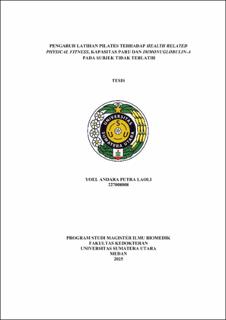| dc.description.abstract | Exercise is a structured form of physical activity performed with the aim of improving fitness, health, or physical performance. Physical activity includes any form of body movement that involves muscle contraction and energy expenditure, whether done formally such as sports activities in general. The researcher conducted sports activities in the form of pilates exercises. Pilates exercises are mind-body exercises that focus on stability, flexibility, strength, muscle control, posture, and breathing. The exercises can be done on a mat. Pilates exercises can produce statistically significant improvements in abdominal endurance, muscle flexibility, and endurance of the human body. The benefits of Pilates exercise can increase heart and lung muscle strength, increase flexibility and fitness, increase immunity and can improve posture. This research method is a quantitative method with a true experimental approach using a pretest-posttest control group design. This design aims to determine the effect of pilates training on health related physical fitness (HRPF), lung capacity, and Immunoglobulin A (IgA) levels in untrained subjects with a sample of 11 USU FK students who do not have routine or untrained sports activities. Results: The provision of Pilates Exercise on Health Related Physical fitness (Cardiorespiratory, Muscle Strength, Muscle Endurance, Flexibility, Body Composition) of research subjects after 8 weeks of Pilates exercise significantly increased muscle strength, muscle endurance and flexibility of untrained FK USU students. Similarly, cardiopulmonary endurance and body composition with pilates training for 8 weeks can increase cardiopulmonary endurance and reduce body composition (fat percentage) although statistically the value is not significant. While the Lung Capacity of the research subjects after pilates exercise before and after exercise for 8 weeks gave an influence on Lung Capacity although statistically not significant. Immunoglobulin-A of the research subjects after Pilates exercise before and after exercise for 8 weeks had an effect on Immunoglobulin-A although statistically not significant.Conclusion: Pilates exercise for 8 weeks had a significant effect on muscle endurance, muscle strength and flexibility of untrained subjects. Pilates exercise for 8 weeks did not have a significant effect on lung capacity (VC) of untrained subjects. Pilates exercise for 8 weeks did not have a significant effect on Immunoglobulin A levels of untrained subjects. | en_US |


